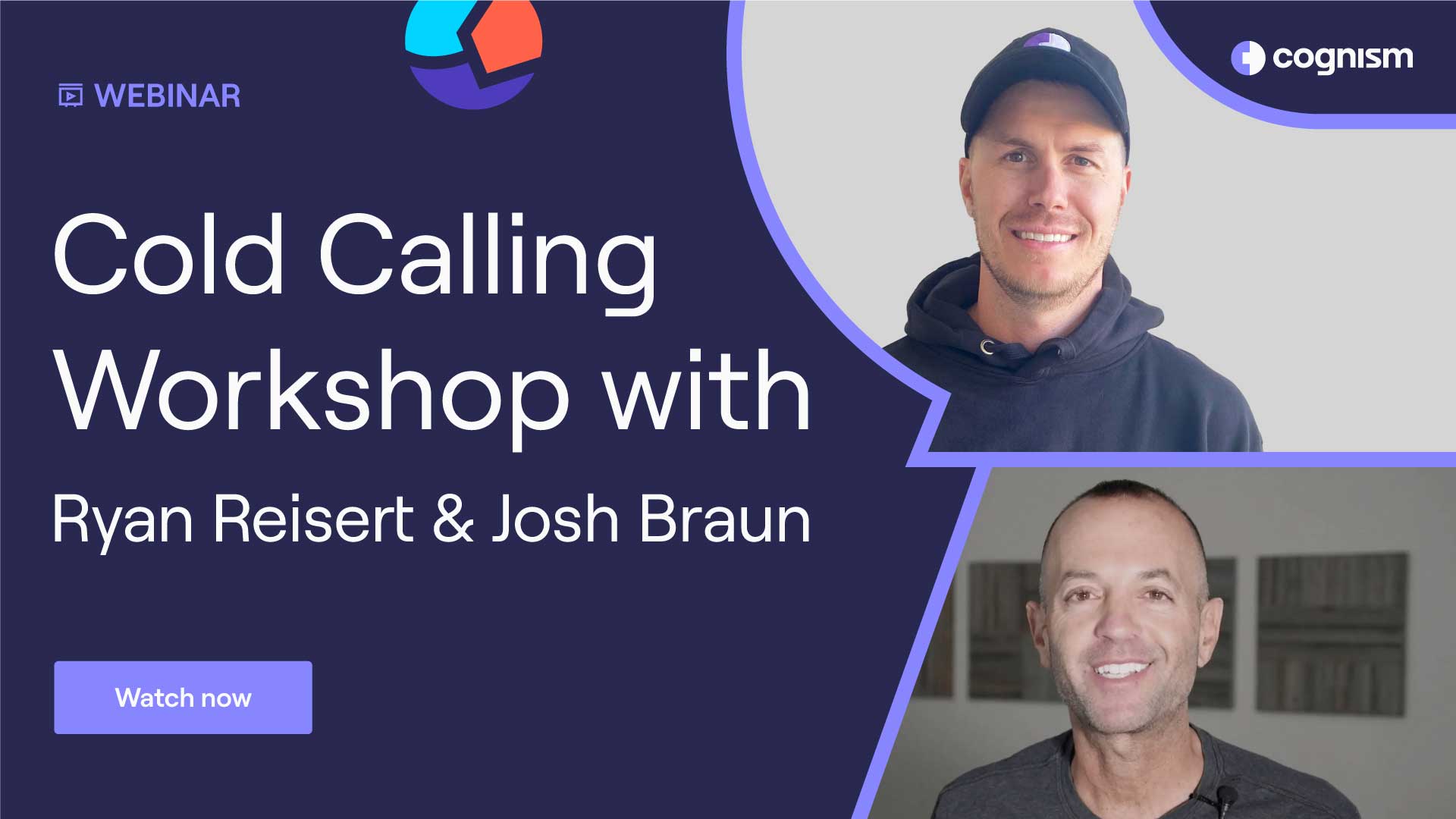What is Sales Intelligence?
Sales intelligence is the data that salespeople and marketers use to reach their prospects. Vendors like Cognism collect that information from different sources, process it, and turn it into actionable insights.
Sales intelligence data combines real-time insights with up-to-date contact details. It enables sales and revenue teams to identify people in the market to buy right now, nurture opportunities, and move deals forward faster.
For example, with sales intelligence data, you’ll know when a high-value account is searching for a solution like yours. Then, your salespeople can identify the company’s decision-makers and start multithreading at the right time to make a deal happen.
/Cognism%20Product%20-%20Compressed/Cognism-alternative-competitor-listicle-webp-2.webp?width=860&height=670&name=Cognism-alternative-competitor-listicle-webp-2.webp)
What's on this page
Who uses sales intelligence?
Sales intelligence is used by revenue teams within B2B organisations. Generally, it’s used by sales reps, account executives, marketers and RevOps to find contact data, qualify leads faster, keep systems up-to-date and ultimately make the sales process more straightforward.
Where does the data come from?
You can get sales intelligence from various internal and external sources. For example, your prospects can provide valuable insights about your competitors during sales calls. Also, all customer interactions logged and administrated in your CRM serve as internal sales intelligence and will inform your sales strategy.
Sales intelligence platforms automatically enhance your internal data in a scalable way. They crawl millions of public and private sources to gather external sales intelligence data, processing and cleaning it before making it available to other companies.
Reputable databases keep their data fresh, comply with applicable privacy laws, and facilitate data syncing with your existing workflows and tools.
However, third-party sales intelligence data has different accuracy, completeness, and compliance levels. The quality of continuous sales intelligence depends on suppliers’ access to advanced data processing technology and resources. Screening the provider of choice and evaluating its alternatives before purchasing is essential.
Sales intelligence data points
B2B data is the fuel for sales intelligence. You must combine personal and organisational data points to get the most detailed picture of your prospects. You can build targeted lead lists and warm up cold calls.
Here are must-have sales intelligence data types for effective sales.
1. Accurate contact data
You’ll need a source of accurate contact data to keep up with prospects in a dynamic business landscape. As they get promoted and switch jobs, you can use a sales intelligence database with real-time updates to contact the prospects on your list. Contact data includes data points like:
- First and last name.
- Job title.
- Work email address.
- Direct dial.
- Social media profile links.
2. Company and account data
Firmographics help researchers research companies, segment audiences, and evaluate the total addressable market. Successful sales teams allocate their resources based on insights into a company’s industry, revenue, or number of employees.
Combining account and contact sales intelligence allows sales leaders to forecast more accurately, formulate more effective strategies, and drive more growth.
The data points for account-level insights include:
- Company size.
- Industry.
- Valuation and revenue.
- Investors.
- Org structure.
- Technographics (their tech stack).
3. Intent data
Intent data shows when an account is actively in-market by analysing the content they consume. It informs sales teams when prospects are most receptive to their pitch and enables reps to slide into buyers’ inboxes before competitors do.
Bombora is a leading intent data provider and gathers consent-based sales intelligence data from sites where B2B buyers do research. Cognism partnered with Bombora to enable our customers to engage with the right prospects at the right time. Some examples of intent insights include:
- Hiring activity.
- New people in leadership positions.
- New funding round.
- Mergers and acquisitions.
- Visiting your website.
Once you identify your ICP in Cognism, you can prioritise companies with the highest intent score for your selected topic. Planixs use Cognism to save ten hours per week. Their narrow target market makes intent data particularly useful since they can see specific interest in the niche industry in which they operate.
4. Technographic intelligence
Technographic data informs you about the technology a target company or prospect uses. It provides insights about current workflows and how your solution can improve them. This type of sales intelligence is particularly useful if your solution resolves a pain point your competitors don’t. You’ll be able to go in with clear battle cards for how your solution differs from what a prospect currently has in place.
5. Sales events triggers
Sales triggers alert you about changes that affect your target companies and prospects over time. B2B sales triggers, like buying intent signals, provide contextual data, highlighting events that may result in a sales opportunity. For example, when your target account appoints new leadership or a company is acquired or lists shares on the stock market.
Combining different sales intelligence insights helps sales and marketing teams gain a competitive edge. The teams with the highest-quality data will have a considerable advantage over their rivals.
What’s the difference between a CRM and sales intelligence?
CRMs are used to enact the sales cycle, whereas sales intelligence helps you gather the data you need. The data collected will maximise the value of your CRM data. Contact and account data in your CRM decays quickly as buyers change companies and roles and businesses get acquired or branch out to other regions.
To keep it usable, you must keep it up-to-date. By regularly enriching the contact data you’ve collected and filling in the gaps in your CRM records, you ensure the sales process is efficient, and reps don’t waste time chasing dead leads.
When choosing a sales intelligence solution, ensure it integrates with your CRM. You shouldn’t need to manually synchronise the two programs; your sales intelligence may work as a plug-in inside your CRM without switching windows.
Seamless integrations with your tech stack
For example, Cognism has an advanced integration with Salesforce, allowing you to import your Salesforce data to Cognism and access search filters specific to your Salesforce CRM.
You can also use Cognism’s accurate data to enrich new leads, contacts or accounts that enter your CRM.
/Cognism%20Product%20-%20Compressed/sales-companion-integrations-webp.webp?width=2000&height=2000&name=sales-companion-integrations-webp.webp)

Sales Administrator @Simpleshow

How should I use sales data?
Sales intelligence makes these six areas of your sales process more effective:
1. Create an ideal customer profile
No B2B company can succeed by being all things to everyone. Companies must begin by targeting a narrow niche (the narrower, the better) and dominating that space until they can use it as a base to expand.
Sales and marketing teams should collaborate to create an ideal customer profile (ICP), leveraging sales intelligence data to achieve this. By analysing your current customer base, you can use a sales intelligence database to find companies and individuals who fit your ICP.
For example, if you’re targeting HR executives in EMEA-based companies with less than 50 people, use sales intelligence to create an accurate email list of HR managers and directors that fit the bill. Then, your marketing team will be able to warm them up with relevant, personalised content.
2. Clean customer data
The more you know about a prospect, the easier it is to sell to them. Detailed information can help you find the right angle to craft a message that resonates with their pain points. However, it’s difficult to manually keep CRM records up to date with complete and accurate data. B2B is constantly changing. People get new jobs, and companies merge and change ownership.
Some sales intelligence platforms offer data enrichment functionality that ensures your existing sales data and new data that flows into your systems are fresh. This means you don’t waste time talking to dead leads; there are no more duplications, better organisation, and less time spent on manual, repetitive tasks.
Integrating sales intelligence into your CRM can automatically refresh existing data. It also gives you a new dimension of information, including financial insights, such as funding rounds and company news, so your sales team can grab new opportunities to contact and sell.
3. Lead scoring
Once you’re at the stage where you’re engaging with your prospects with personalised content, sales intelligence can help you determine who is genuinely interested and who has you on ignore.
You can monitor relevant sales event triggers and gauge their buying intent by the content they consume online. Or if you're main sales strategy is cold calling, you can score leads based on the availability of other contact details, i.e. verified mobile numbers. Then, assign each prospect a score, indicating who your salespeople should be reaching out to first.
Having this kind of data intelligence at your fingertips takes the guesswork out of the sales process.
4. Qualification, messaging and outreach
Once your leads are sufficiently warmed up, it’s time for the sales team to take control - with sales intelligence to help them.
Your SDR’s first task is to call the prospect, begin the conversation, and qualify them for or outside the process. Real-time sales intelligence ensures they have the correct contact data, so they’re not wasting their time trying to get hold of prospects who have long since moved on.
In addition, because sales intelligence discovered these prospects when working with the ICP, salespeople know they’re calling similar prospects who face similar challenges. It’s suddenly easier for salespeople to get their messaging right and truly position your product as the answer to your prospects’ pain.
5. Accelerate sales cycles
Sales intelligence gives you everything you need to make fewer calls, contact the most relevant people, and hit quota faster. Accurate contract details allow your team to skip gatekeepers and reach straight to decision-makers because you give them all the knowledge they need before engaging with customers.
It’s especially important if you’re selling to enterprise clients and your deals require a sign-off from multiple stakeholders. The more intelligence you gather about them, the faster you can start multithreading.
6. Make sales more predictable
Sales intelligence insights also make prospecting more predictable. Successful sales teams plan for the future and allocate their resources to maximise revenue. Sales intelligence data allows sales leaders to forecast more accurately, formulate more effective strategies, and drive more growth.
In a world where quality is the main focus, data helps you better understand prospects and customers, who they are, and how and why they buy. This leads to benefits like shortening the sales cycle and closing more deals.
How to choose a sales intelligence tool?
There’s a wide range of sales intelligence products in the marketplace. From tools like Cognism that are designed for whole revenue teams, to Kaspr, that’s an all-in-one contact data and outreach platform for individual users or SMBs. Here’s a mini guide to help you choose the right solution. 👇
1. Define what you want to achieve
The first thing to do is assess what you want to achieve. Different solutions work slightly differently, so it helps to know which features will bring you the most essential benefits. Some possible considerations are:
-
Improving lead generation by creating accurate lists of possible future customers.
-
Better targeting and sales qualification by identifying the prospects most likely to buy.
-
Updating existing customer records in your CRM and enriching data that enters your workflows.
-
Identifying the right time to contact prospects who are most likely to buy from you.
When you define the desired outcomes, you can choose a tool to help you deliver them.
2. Investigate the market
You’ve learned what functionalities you need from your sales intelligence tool you can narrow your choices with three simple steps.
- Look at software review sites, such as G2, Capterra and TrustRadius.
G2 lets you filter the entire sales tech market by function - so you can easily find a list of every sales intelligence tool available. You can rank that list by price, popularity and, perhaps most importantly, customer review score.
Then, go deeper and read what real customers thought of each product, what works well for them and what doesn’t.
- Visit company websites and social media.
Learn how the company promotes its solutions and positions itself against competition to get a feel for the product. Check if your preferred provider has a YouTube channel—it's an excellent resource for quickly uncovering information.
- Talk to your network.
Remember the B2B saying - “people buy from people.”
Ask your contacts in the industry about the tools they use and if they like them. You’re more likely to get an honest opinion from a friend or colleague.
3. Get a demo and test the data
Once you’ve narrowed your shortlist to two or three solutions, it’s time to start engaging with sales teams. Don’t hesitate to take their sales intelligence platform for a spin, test their data, and ask questions based on the outcomes you want to achieve. Here are seven questions to ask:
- How accurate is your sales intelligence?
The more accurate the insights, the more effective your sales. Sales data deteriorates quickly. Ask how they source their data and how often it gets refreshed.
- What insights can your data give me?
If discovering sales triggers or gauging intent is a priority, ensure your sales intelligence tool can provide the necessary information.
- How complete is your data?
How in-depth will your data provider go? For example, some tools may tell you what sales tech a company uses; this can be dynamite information in B2B. But not all tools may give you that level of detail.
- Is your data compliant?
Ensure the sales intelligence database complies with data privacy regulations, such as GDPR and CCPA. The penalties for non-compliance can be severe.
- How much does it cost?
Sales intelligence is an investment, so work out possible returns. Like most things in life, you get what you pay for. Avoid going for the cheapest option; when it comes to B2B tech, benefits, features, and ROI are most important.
- On average, how soon do your customers see ROI?
When buying new tech for your team, you’ll want to ensure it will give you the swiftest possible return. Asking this question will allow you to judge based on the only thing that matters in B2B - the bottom line.



